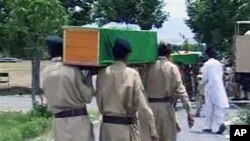Senior officials of the U.S. and Pakistani governments convene in Washington Wednesday for another round of meetings in the two countries' strategic dialogue which begun earlier this year. The talks follow a strain in relations spawned by an Afghan border incident.
U.S. officials say the three-day dialogue is timely, coming after what they term a period of tension following the accidental killing in late September of two Pakistani soldiers by a NATO helicopter along the Afghan-Pakistan border.
Pakistan responded by closing a key crossing point for allied supply convoys into Afghanistan, exposing idled fuel trucks to attacks by Pakistani militants.
The United States apologized for the deaths of the soldiers and Pakistani authorities reopened the crossing after ten days. U.S. Deputy Special Representative for Afghanistan and Pakistan Frank Ruggiero insists the matter has not significantly damaged U.S.-Pakistan relations.
"There's been a joint assessment, a joint investigation, on how to proceed and make sure this doesn't happen again in terms of delineating the border for ISAF military operations," said Ruggiero. "I think that the Torkham gate has reopened now. So coalition supplies that go through Karachi through Pakistan have continued now. And I think that the actual impact of that 10-day closure was pretty minimal."
Secretary of State Hillary Clinton and Pakistani Foreign Minister Shah Mehmood Qureshi head the teams for the dialogue which will also include defense and military chiefs, and be climaxed by plenary meetings Friday.
The talks are expected to yield an Obama administration commitment for a multi-year security pact with Pakistan similar to the five-year $7.5 billion U.S. civilian aid package approved by Congress last year.
Pakistan currently receives about $1.5 billion a year in U.S. military and security aid. The Islamabad government has sought a long-term commitment to assure continuity in aid programs.
The meetings here, which begin with working group sessions, will include discussion of reprogramming U.S. civilian aid to help Pakistan rebuild after its ruinous floods this year.
They will also deal with Pakistan's military response to militants in tribal areas in the country's north.
U.S. deputy envoy Ruggiero commended Pakistan's efforts against al-Qaida and the Pakistani branch of the Taliban, but said more action is needed against Afghan militants taking refuge on its soil.
"I think on the entities that are a clear common security threat to the United States and Pakistan, they have taken significant steps. They have moved military forces into the FATA, into the Northwest Frontier Provinces. They have taken on various extremist groups," Ruggiero said. "We would call for them to do the same thing in North Waziristan on organizations like the Haqqani network. And we will continue that discussion with them."
Named for its leader Jalaluddin Haqqani, the Haqqani Network is a group within the Afghan insurgency based in Pakistan near the Afghan border.
The New York Times quoted a senior U.S. official Tuesday as saying a Pakistani failure to crack down on the militants would jeopardize Congressional support for more aid.
Pakistani officials, while grateful for large-scale U.S. flood aid, will reportedly complain about what they see as an overall slow pace of economic help and a lack of access to U.S. markets for Pakistani goods.
It will be the third round of the strategic dialogue, which began in Washington in March and continued during Secretary Clinton's Pakistan visit in July.
US, Pakistani Leaders Meet After Period of Tension




